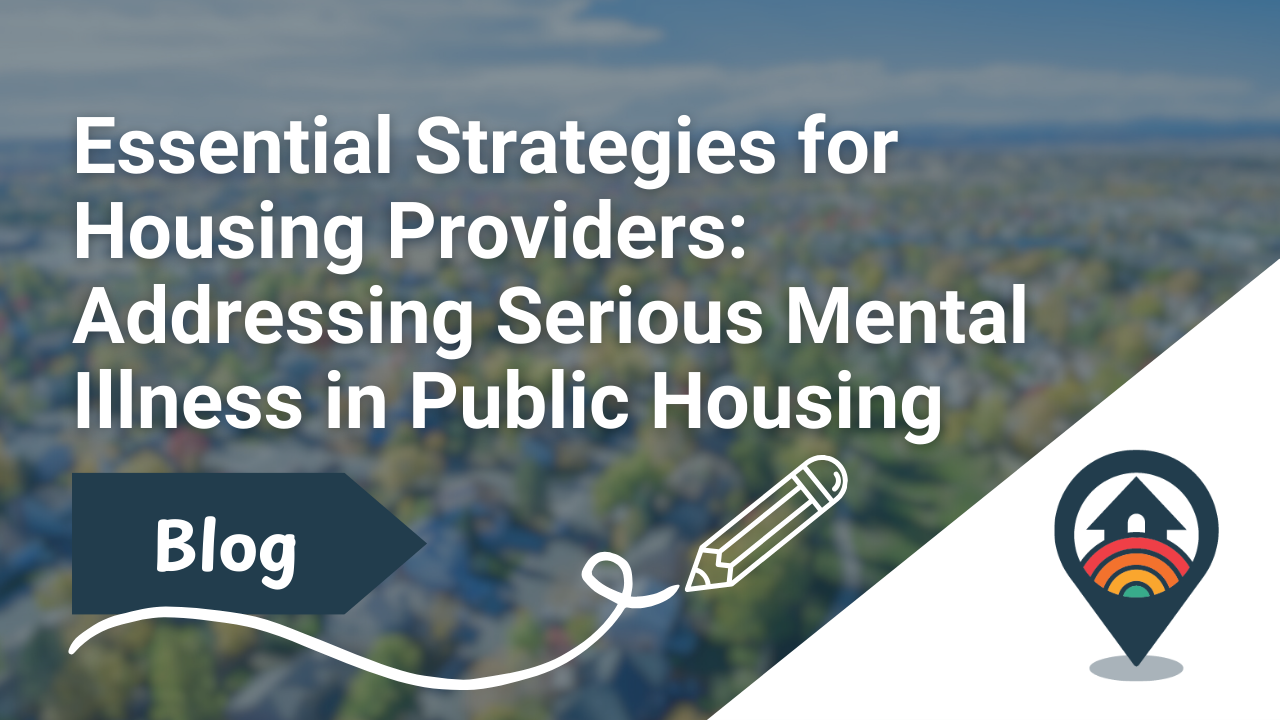Supporting residents with serious mental illness is a critical challenge for housing providers, especially those working in public housing and multifamily settings. This blog draws on the Homeless and Housing Resource Center’s (HHRC) webinar “Public Housing and Serious Mental Illness: Practical Recommendations for Housing Providers” to answer common questions providers have about supporting residents with serious mental illness. Whether you’re new to this issue or looking to enhance your approach, these key takeaways will help you create a more supportive and stable environment.
What is serious mental illness, and why should housing providers understand it?
Serious mental illness refers to mental health conditions that are persistent, last at least a year, and significantly impair an individual’s ability to function in daily life. Common examples include schizophrenia, bipolar disorder, and major depressive disorder. Housing providers should understand serious mental illness because a significant percentage of people experiencing homelessness are affected by these conditions. This knowledge enables providers to create supportive environments that can prevent eviction and promote housing stability.
What challenges do residents with serious mental illness and substance use disorders face in maintaining housing?
Residents with co-occurring serious mental illness and substance use disorders may have challenges with consistent rent payment, maintaining the condition of their living space, and managing relationships with neighbors. These challenges can lead to eviction or other housing instability issues, making it essential for housing providers to offer comprehensive support, including connections to treatment services.
How can housing providers identify and address the needs of residents with serious mental illness?
Housing providers can identify residents with serious mental illness by observing signs such as difficulty with daily living activities, disorganized thinking, or extreme mood swings. Addressing these needs involves connecting residents with mental health services, offering life skills training, and creating a supportive environment that accommodates their specific challenges.
What are the best practices for housing providers when supporting residents with serious mental illness?
Best practices to support residents with serious mental illness include adopting a trauma-informed approach, avoiding criminalization of residents’ behaviors, and offering access to appropriate mental health and substance use services. Housing providers should also focus on building trust, offering clear communication, providing residents with choices, and respecting a resident’s personal space.
What is a trauma-informed approach in housing, and why is it important?
A trauma-informed approach recognizes the prevalence of trauma among residents and its impact on their behavior and well-being. It involves treating residents with empathy and respect, avoiding re-traumatization, and ensuring that interactions are supportive rather than punitive. This approach is essential for creating a safe and healing environment for residents with serious mental illness.
How can housing providers build trust with residents who have serious mental illness?
Building trust involves consistent, respectful communication, providing choices, and being patient with change. Housing providers should prioritize relationship-building, which encourages residents to engage with support services and work toward stability.
How can housing providers effectively de-escalate crises involving residents with serious mental illness?
Effective de-escalation techniques include maintaining a calm and gentle tone, using non-threatening body language, and giving residents space. Providers should listen actively, avoid confrontations, and focus on safety and support rather than trying to convince residents of the truth of their perceptions during a crisis.
What community resources can housing providers use to support residents with serious mental illness?
Housing providers can collaborate with local Federally Qualified Medical Centers (FQMCs), mental health clinics, and social services agencies to provide residents with access to healthcare, mental health treatment, and other supportive services. Community-building activities, such as resident councils and regular events, can also enhance the supportive environment.
These questions highlight key considerations for housing providers when working with residents with serious mental illness. For more detailed guidance and practical recommendations, watch the full webinar available on the HHRC website.
This blog post was developed with the assistance of generative artificial intelligence.


